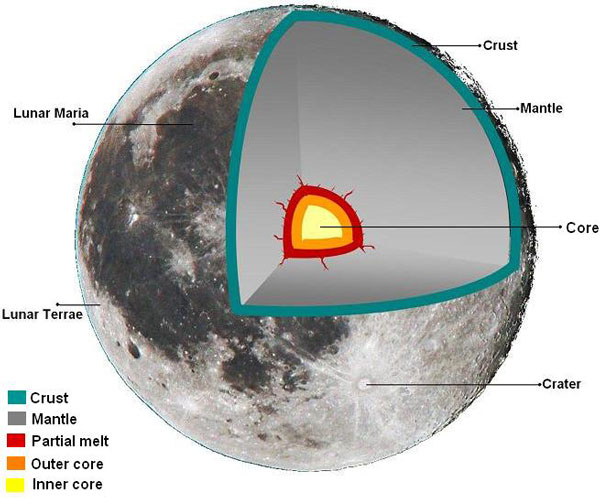In a development that significantly advances our understanding of the Moon, researchers have revealed what is inside the Moon’s core. Contrary to whimsical notions like the Moon being made of green cheese, this discovery provides concrete evidence about the core’s composition, which is neither entirely solid nor fully molten.

What is the Moon’s Core Made Of?
Speculations about the Moon’s core have been abundant, but recent findings by a team of astronomers have provided definitive answers. Led by French astronomer Arthur Briaud, the team has established that the Moon’s core consists of a solid metal ball encased by a molten outer layer. This conclusion is based on a comprehensive study that analyzed simulations and existing data from various sources, offering a detailed profile of the Moon’s internal structure.
The pivotal study, conducted at the French National Centre for Scientific Research and published in the Nature journal, utilized data from NASA’s Gravity Recovery and Interior Laboratory (GRAIL) mission launched in 2011. During this mission, NASA sent two spacecraft into orbit around the Moon to measure the gravitational forces between them as they flew over different lunar regions. This data allowed scientists to pinpoint the positions of the spacecraft relative to each other, providing critical insights into the Moon’s gravitational field.
What’s Inside the Moon’s Core?
Seismic data remains the most reliable method for determining the composition of celestial bodies. In addition to GRAIL seismic data, Briaud and his team used Lunar Laser Ranging (LLR) to measure distances between the Earth and specific lunar areas. By combining these data sources, the team was able to create an in-depth profile of the Moon’s features. They built various simulations of potential cores to identify which model best matched the observed characteristics.
Their results challenge previous assumptions about the Moon’s magnetic field evolution. They confirm the existence of an inner core, supporting the theory of a global mantle overturn scenario. This scenario suggests that denser material in the Moon’s core is situated at the center, while less dense material migrates upwards, contributing to a dynamic internal structure.
The study also highlights similarities between the cores of the Moon and Earth. Both have a solid inner core surrounded by a fluid outer layer. The modeling estimates the radius of the Moon’s inner core to be approximately 258 kilometers (160 miles), with the outer core extending to about 362 kilometers (225 miles). The density of the inner core is comparable to that of iron, around 7,822 kilograms per cubic meter.
What Does This Mean for the Future?
These findings not only confirm earlier hypotheses about the Moon’s core but also have significant implications for future lunar exploration. As more countries invest in lunar missions and consider establishing a human presence on the Moon, understanding its internal composition is crucial. This knowledge will aid in designing better instruments and habitats capable of withstanding the Moon’s environment and will guide resource extraction efforts, such as locating water ice essential for sustaining life.
Moreover, these discoveries enhance our comprehension of the Moon’s formation, structure, and geological history. They offer valuable insights that can inform future exploration missions and technological advancements. As space agencies continue to explore the Moon, these findings will help pave the way for more informed and effective exploration strategies.
Researchers have revealed what is inside the Moon’s core, marking a monumental step in lunar science. This breakthrough not only enriches our knowledge of the Moon but also lays the groundwork for future explorations, ensuring that humanity’s return to the Moon is both informed and successful.
For further Information, visit: https://www.slashgear.com/1583425/innovative-new-technologies-nasa-is-exploring/?zsource=msnsyndicated
Read our previous articles: https://scitechupdate.com/index.php/researchers-develop-biocomputer-by-linking-16-brain-like-structures-grown-from-human-cells/
Breakthrough Material: NASA’s GRX-810 Could Change Everything
https://scitechupdate.com/index.php/scientists-synthesize-diamonds-in-just-15-minutes/
https://scitechupdate.com/index.php/researchers-notify-of-u-s-groundwater-depletion-by-2050/
https://scitechupdate.com/index.php/first-5g-enabled-surgery-performed-by-doctor/
First 5G-enabled Surgery performed by Doctor
Hitchhiking Aliens: New Research into Panspermia
Two new COVID variants, called ‘FLiRT’ in the United States
Sex and Gender Studies: Unlocking Equality and Social Justice
https://scitechupdate.com/index.php/scientists-say-this-blood-type-increases-risk-of-early-stroke/
https://scitechupdate.com/index.php/the-harmful-impact-of-the-r-word-why-it-needs-to-be-retired
https://scitechupdate.com/index.php/israel-advances-cancer-treatment-with-genomic-profiling/https://scitechupdate.com/index.php/stomach-cancer-causes-signs-and-treatment/

